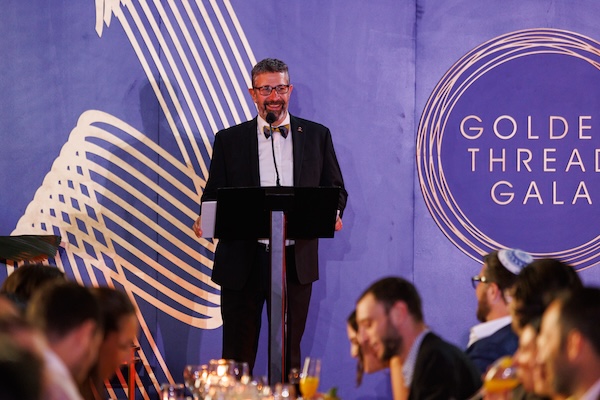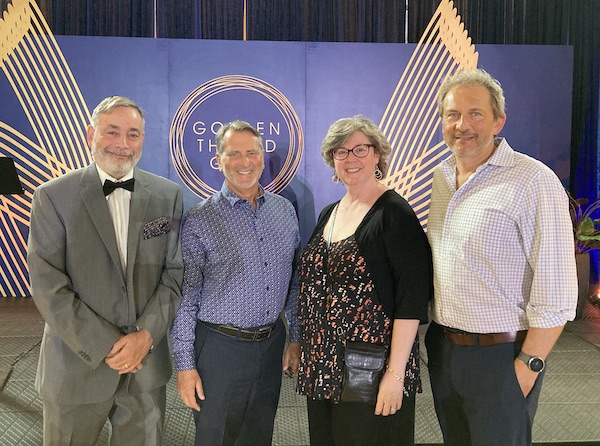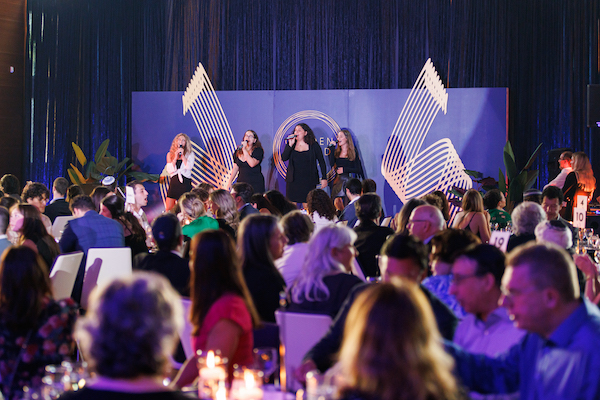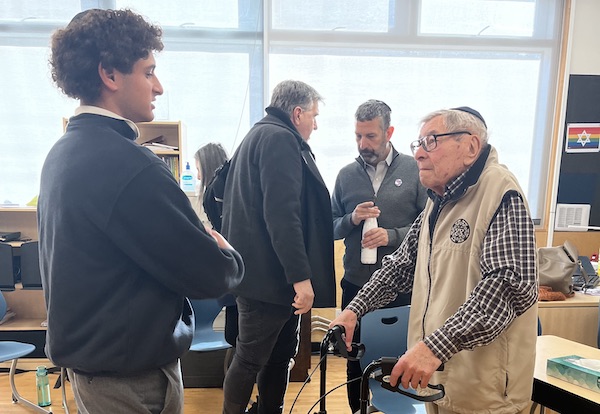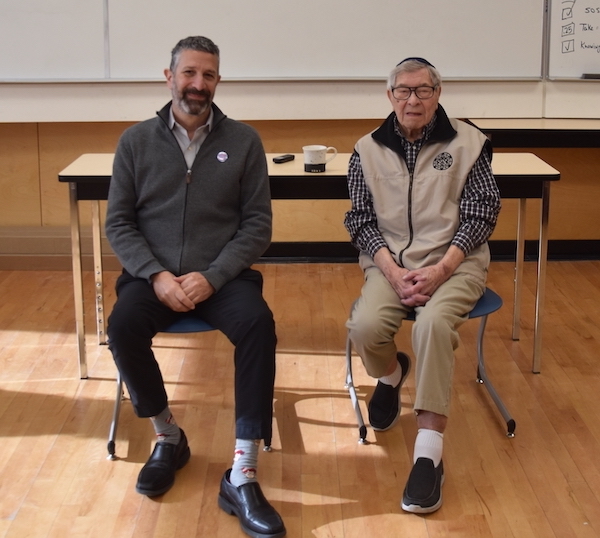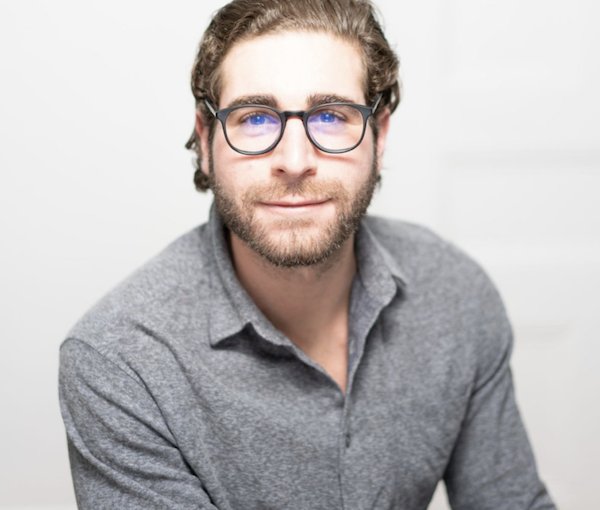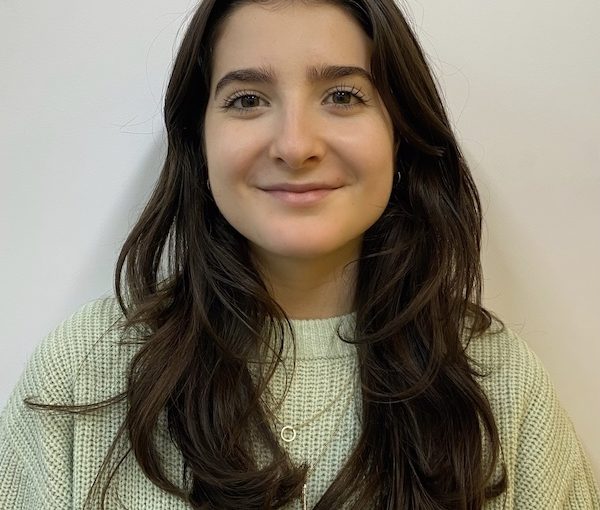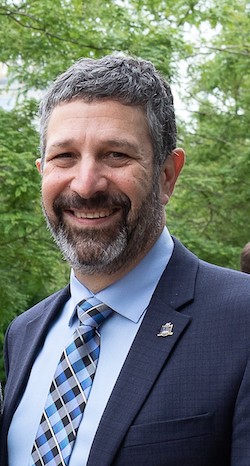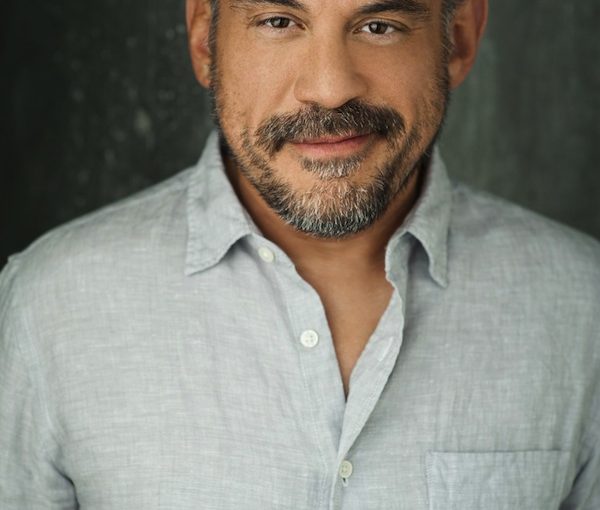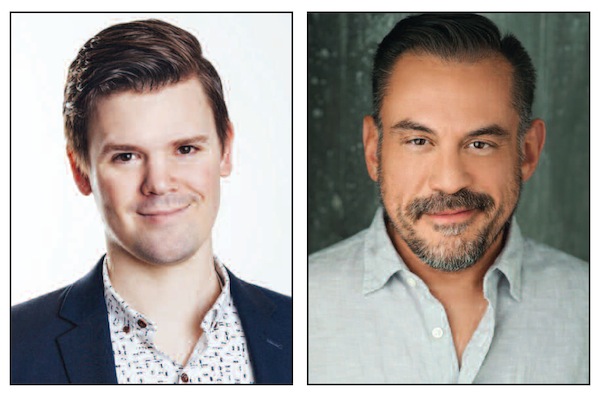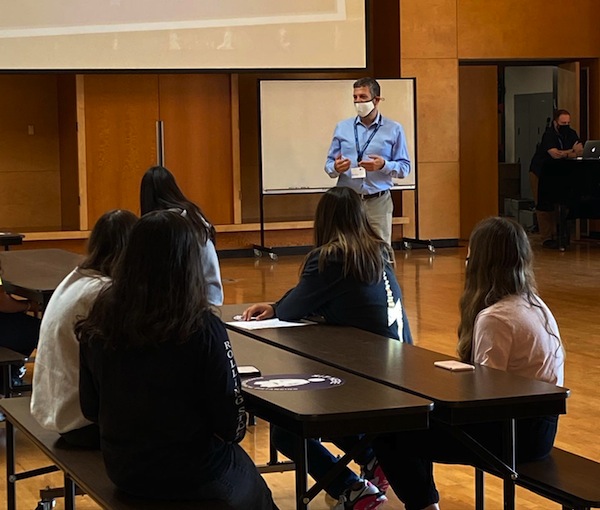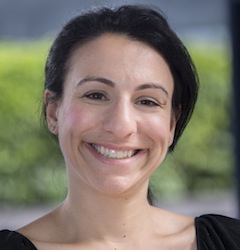King David High School principal Russ Klein at the school’s 2023 Golden Thread Gala fundraiser. About to retire, this year’s event will celebrate his 16 years of service. (photo from KDHS)
Russ Klein stepped into the role of head of school at King David High School for a two-year temporary stopgap when Perry Seidelman retired in 2008. This June, he retires after 16 years at the helm.
“This job has just been a gift,” Klein said, before clarifying: “It hasn’t been a job.”
Klein was a vice-principal at Prince of Wales Secondary, in the Vancouver public school system, and was on track to become a principal when the position at KDHS opened. One of the teachers at PW was on the search committee to hire the new King David head of school and asked Klein – hounded might be a more appropriate term – to consider the role.
“I told him a number of times, using choice language, what I thought of that idea,” Klein recounted recently in his corner office at the school.
Finally, Klein consented to meet the search committee’s director, who convinced him to tour the school. He was suddenly interested.
Klein’s superiors at the Vancouver School Board thought a two-year stint as principal at an independent school would be good experience before returning to the public system, and a deal was struck.
“I thought I was in and out,” he said. “I thought I was coming because they needed someone. They knew I had a two-year contract. That’s what I signed.”
The King David experience, though, changed his life.
“When the Vancouver School Board invited me back to be a principal at one of our local Vancouver schools, I had to think long and hard about it and I realized I didn’t want to leave,” said Klein. “I had joined a community that was so different than anything I had experienced before.
“In this job, I found a community that I didn’t know I had,” he said. “That was beyond special. I really do think of this job, this position really, as a gift.”
Klein, who was divorced, found not only professional fulfilment at King David, but personal, too. At the school, he met Deborah Youngson, a King David parent, and they have been together for 13 years.
“Deborah is the gift that keeps on giving,” he said. “She is just simply unbelievable. She has managed to help me through the highs and the lows of this job because I could not have done it on my own. Believe it or not, it may be a small school and it may be a small Jewish community, but there’s a lot of pressure that one feels and trying to look like the pressure isn’t impacting you when it really is, is not always so easy. But having a person who understands and is supportive made the biggest difference in the world.”
There are many tangible and intangible measures of success in the education field. The year Klein started, the Grade 8 incoming class had 18 students. This year’s Grade 8 intake was 65. Total school population has risen to 270 from fewer than 140.
“That’s very pleasing for all of us because the whole goal is to provide a Jewish education for as many Jewish students as we can,” he said. “That’s the mission.”
As the only Jewish high school in town, King David has an obligation to reach the widest swath possible, he said.
“We need to be able to provide as much of an education as we can from secular to, let’s say, a more traditional family,” Klein said, noting they use the term pluralistic Jewish school. “We also describe ourselves as a community school. We are open to everyone. We want everyone to be here. We are not a religious school – I will just clarify that with people – but we are a faith-based school.”
Among the advances during Klein’s tenure has been the solidifying of the Judaics department and the requirement for all students to participate in that component. He cites as a point of pride the annual Grade 8 trip to Israel – though global events have hampered that tradition in recent years.
Taking Grade 8s to Israel is rare, he said, as most Jewish schools in North America wait until students are a bit older. Klein thinks getting kids to Israel as early as possible is invaluable.
Dorin Eilon-Heiber, the school’s Hebrew coordinator and Judaic studies teacher, organizes the Israel trip and she and Klein have now accompanied more than 500 students on the journey.
“That’s probably one of the biggest satisfactions I have,” he said, laughing that it’s hardly a vacation. “But it was a privilege.”
The school had previously taken students on Israel trips but when Klein arrived they began taking the Grade 8s.
“It was considered young and we even had pushback here in taking them [at that age],” Klein acknowledged. However, the impact on the students throughout their high school experience is profound, he said. “I would ask [students], why do you come to a Jewish day school? And the kids don’t know. To be honest, many of them know they’re Jewish, [but] they’ve never been to Israel, they don’t know anything about Israel. My goal was to take them in Grade 8, let them fall in love with Israel and – you know how teenagers are, puppy love, etc. You go to Israel in Grade 8 and it is one of the most special moments you have in your life. We take them to meet Israelis, to spend time in Israeli homes and, literally, they fall in love.
“And then they have four more years to understand why they are actually at a Jewish school or why they’re learning Hebrew or why the history that they are learning is meaningful,” he said. “I just think it changes the conversation for them.”
Then worldwide events intervened. COVID prevented the annual excursion in 2020, 2021 and 2022. By 2023, the only students who had been on the school trip to Israel were in Grade 12. “So, last year, we were able to organize with our Israeli sister school, Har Vagai, two trips,” said Klein. “We took one in October with our Grade 10 students and we took one in March with our Grade 11 students, trying to catch up.”
Doing two trips was too stressful on the school and stressful on the Israeli hosts. “So, we decided at that point that this year we would move the trip to Grade 10 because we couldn’t catch up to get back to Grade 8,” he said.
There were plans to take the students just after Pesach this year. “And then, of course, Oct. 7 happened and we’re not going to Israel in Grade 10 this year,” Klein said. The sister school, located just outside the Vancouver partnership community of Kiryat Shemona, in the Galilee Panhandle, is mostly evacuated due to attacks from Hezbollah in southern Lebanon.
“They are all in hotels and other places and it’s a terrible situation,” said Klein. “Dorin and myself and our spouses are heading to Israel in a few weeks and we’re going to visit our sister school, take them our love and presents, and we’re also going to take our alumni in Tel Aviv and Jerusalem out for dinner, offer them our love and support and just say, hey, we’re here with you.”
Klein credits the entire KDHS team for everything he has accomplished over 16 years, but especially for stepping up during COVID.
Managing education during the pandemic may have been easier for independent schools, being able to navigate separate from a massive bureaucracy, said Klein. Within two days of shutting down in March 2020, King David classes were completely online. Unlike public schools, students were back in classes, with extensive protocols, at the beginning of June.
In addition to the immediate issues of a deadly pandemic, there have been conflicting ideas about vaccines, masks and the broader needs and solutions in dealing with it. Klein credits parents and staff with superb resilience and patience.
There was a loss, though, of some of the social factors. Relationships between school staff and parents were less robust than before the pandemic simply because face-to-face contact was reduced, he said.
COVID has not been the only difficult time.
“The lows are tragic moments, when alumni passed, parents passed,” he said. “Of course, most recently, with the loss of Ben Mizrachi in Israel at the Nova Music Festival [on Oct. 7]. Those are really hard, especially to try and lead when you are feeling as heartbroken as everybody else. Those lows are pretty clear.”
Klein calls the past 16 years “the most meaningful in my life,” bringing him back into a community he had mostly left behind.
“I went to Talmud Torah [elementary school], I was part of the Jewish community in Vancouver. I had my bar mitzvah at the Beth Israel and, then, like a lot of people of my generation, I did not participate,” he said. “I went to Israel in my 20s a couple of times, spent time on kibbutzim and had that experience and fell in love with Israel, but I wasn’t living any religious life or any traditional life whatsoever. When I came to the school, my whole life changed, and I had community and that was a gift.”
As for retirement, Klein has planned not to plan.
“Very intentionally, I am not making a plan,” he said. “I’ve got tension and stress that needs to ooze out of me and it’s going to take a period of time for me to get to know myself again in a different way, without being in a position, to be able to feel relaxed and to not worry every time my phone pings.”
When school reconvenes in September, he and Youngson will be on their way to London to board a cruise to Iceland. Beyond that, he has only one commitment.
Klein’s father, Emerich, who passed away last year, was a survivor of Auschwitz.
“I will totally offer my services to VHEC [the Vancouver Holocaust Education Centre] to see if I can do some storytelling for them so I can bring that message,” said Klein. “But that is actually the only thing that I have thought I will definitely want to offer my services for.”
Diane Friedman, co-chair of the King David board, lauds Klein’s 16 years of accomplishments.
“Russ has overseen the transformation of King David into a strong, lively and inclusive Jewish high school,” Friedman said.
She credited Klein, and the King David team during his tenure, with adding an accelerated math and science program, annual school retreats, and an outdoor education program.
“Russ also built up the Judaics program, making it compulsory for all students with no exceptions – it is who we are – focusing on service and volunteerism,” she said. “Russ recognizes that, while our students’ academic achievements are noteworthy, student achievement is so much more than academic marks.”
Under Klein’s leadership, Friedman noted, King David also became a Canadian Accredited Independent Schools member school, which attests that the institution follows national standards and best practices.
“Russ has been a true guiding light for King David,” she said. “He exemplifies the principles and traditions of Judaism, with a sense of purpose, fairness and kindness. Russ has fostered unity and belonging to a point where the King David community is a family … everyone says so, starting with the students and including staff and families. Russ has an open-door policy and strives to create an environment where every student feels welcome and valued.”
Friedman acknowledged the support the school has received from the Diamond Foundation, which owns the land on which KDHS sits and helped fund renovations and the addition of custom modular units on the campus during Klein’s tenure.
While Klein is set to retire before the dramatic development of JWest breaks ground – a project that will ultimately see the school move into the new community hub on the site of the Jewish Community Centre of Greater Vancouver – Friedman credits Klein for collaborating on that project to ensure the long-term stability of the school.
“While seeing Russ off to retirement is bittersweet, we are excited for the future of King David and we look forward to welcoming Dr. Seth Goldsweig as our new head of school this summer,” said Friedman.
Klein’s years of service will be the focus of celebration at the Golden Thread Gala May 22. Information and tickets are at goldenthreadgala.com.

